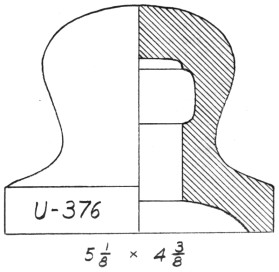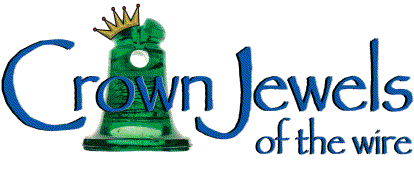Porcelain Insulator News
by Jack H. Tod
Reprinted from "INSULATORS - Crown Jewels of the Wire", June 1977, page 17
NEW PORCELAIN BOOK
"The story of FRED M. LOCKE and his insulators", Gerald Brown, 1977, 82
pages, 7" x 8-1/2" softbound, $3.50 ppd.
I just received this new book by Gerald, and it's really super. Although its
scope is Locke insulators from the earliest to recent, anyone collecting
porcelain insulators should add this book to their library even if Locke isn't
their specialty. Considering the united printing, the book is practically a free
gift at only $3.50.
Initially Gerald wanted to gather under one cover all the
known information on Fred M. Locke insulators, and this was accomplished.
However, Fred Locke's continued activity in the insulator industry made it hard
to arrive at a logical stopping place in the story. To preserve the
continuity, Gerald carried the story on up through the years in which insulators
were still made with any form of Locke marking. The main emphasis is on the
earlier period ~hen Fred Locke was directly involved.
Virtually every known Fred
M. Locke insulator is pictured and described. Gerald spent over a year
corresponding with Locke specialists to round up all the stragglers. Insulators
are presented in photos, art sketches, line drawings whatever could best be
obtained.
The book includes information on all Fred Lockets patents pertinent to
the insulators involved and a compilation of all the Locke markings from the
"wordy" ones initially used up to the last Locke marking used by
General Electric Co.
Gerald worked on this book over a year to make it what it
is. I and several Locke specialist collectors helped in any way we could to make
the book as complete and accurate as possible, and the manuscript got checked
and rechecked by these people until it was in perfect order.
Although it would
be hard to top Gerald's book "Unique Collectible Insulators", I think
be did it with this one, and I'm sure it involved a high degree of personal
satisfaction for Gerald. And we are thankful for the output. If we can't all get
our hands on a Fred M. Locke goody, we can at least look at the pictures in this
book and drool.
I've recently been snooping around in my insulator files and old directories
and catalogs, and here are some marking attributions which we previously had
shown as unattributed.
COLORADO. Seen on small solid knobs. This was a trade name for mine
signaling systems manufactured by the Flint Electric & Manufacturing Co.,
1414 Delgany St., Denver, Colo. It is no surprise that this company operated in
the mining state of Colorado, or that these knobs are found by collectors in the
Colorado area.
MILHAM. Seen on electric sign standoff insulators (the
"spook" variety). This was American Sign Company, Cooley & Willard
Sts., Kalamazoo, Michigan, a manufacturer of electric signs, established 1908.
At least one of the officers of the company was named Milham.
BUNNELL. Previously reported as Bonnell, since the marking was
misspelled on the specimens I have. This was J H. Bunnell & Co., 32 Park
Place, New York, N.Y., established 1879, manufacturer of all forms of electrical
equipment. The BUNNELL was a trade name primarily used on line equipment and
wiring devices -- arrestors, bushings, etc.
C.F.W. & M. CO. This was Chicago Fuse Mfg. Co., Chicago,
manufacturers of fuses, switch boxes, etc. Per directories, the marking could
also be C. F. W & MFG. CO. I won't try to guess what the "W" in
the marking stands for.
R. R. S. Co. This was The Railroad Supply Co., Chicago, Ill.,
established 1889, manufacturer of highway crossing signals, signal supplies and
accessories for railroads. I've seen the marking on miscellaneous porcelain
items for electrical use.
Dick Alumbaugh has sent word of the Porcelain Commemorative Insulator for the
1978 National Insulator Association annual convention next month. As before,
this one will resemble the U-390 style Roman Helmet and will be a green glaze
(should be pretty). The front embossing will be:
8th N.I.A. Convention
Lakeland, Fl.
July 15-17, 1977.
Your special commemorative serial number will appear on the back for an extra
charge of $.50 and only if requested at the tine of ordering. The numbers cannot
be applied after the insulators are fired.
Since Dick's job may prevent him from traveling to the convention in Florida,
he recommends you order by mail, and such early orders will be filled as soon as
the insulators are received. Cost is $8.00 ($.50 extra for serial number) plus
$1.50 postage and handling. Address is Dick Alumbaugh, 4024 Emerald, Apt. #216,
Torrance, CA 90503.

Dear Jack:
I just acquired a real conversation piece and am enclosing a drawing of it.
Dimensions and shape are similar to the U-376A. The color is light blue -- very
peppered with a darker blue. It is marked on the dome LIMA, N.Y. and also
underneath a "NO. 1".
I first saw it about 5 years ago. I've seen it a couple times since, but it
had been made by an uncle of the person owning it and had been in the family
these many years. The "NO. 1" on the underneath side is crudely
scratched in with a sharp pointed tool.
Lew Hohn,
Rochester, N.Y.
- - - - - - - - - -
Dear Lew:
Thanks for sending the data on this new beauty you got. Needless to say, the
LIMA marking and the blue glaze for Lima would be enough, but the shape really
adds frosting.
It's probable, although not certain, that this insulator is related to the
Etheridge patent for pin types, and the diameter of the smooth pin hole fits the
specifications of the Etheridge insulators cataloged by C. S. Knowles Co.
These insulators were for use on ruggedized self-locking pins, allowing the
insulator to rotate on the pin. They were for use in certain deadending and
corner applications. They cataloged a #1090 with a 1" groove and a #1091
with 1-1/2" groove. Both the U-376A and your specimen are the 1-1/2"
size.
Although I left the U-376 number vacant in the Style Chart in the event the
1" groove version ever showed up, we'll tag your item as U-376 and worry
about the other one if and when it ever does show up.
Jack
| 